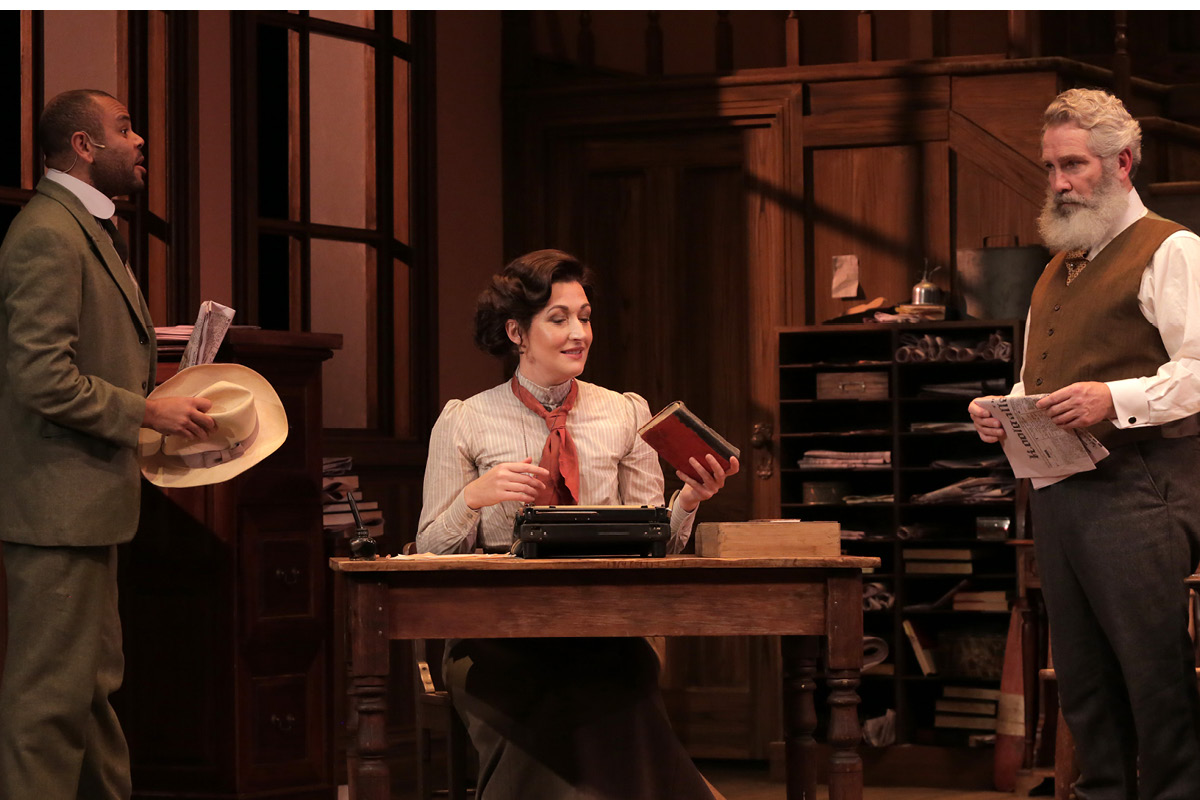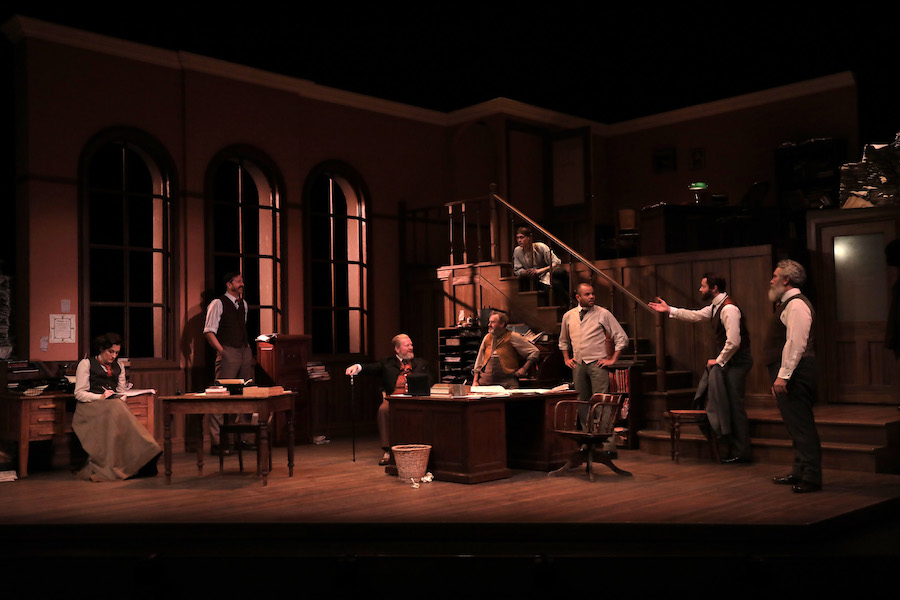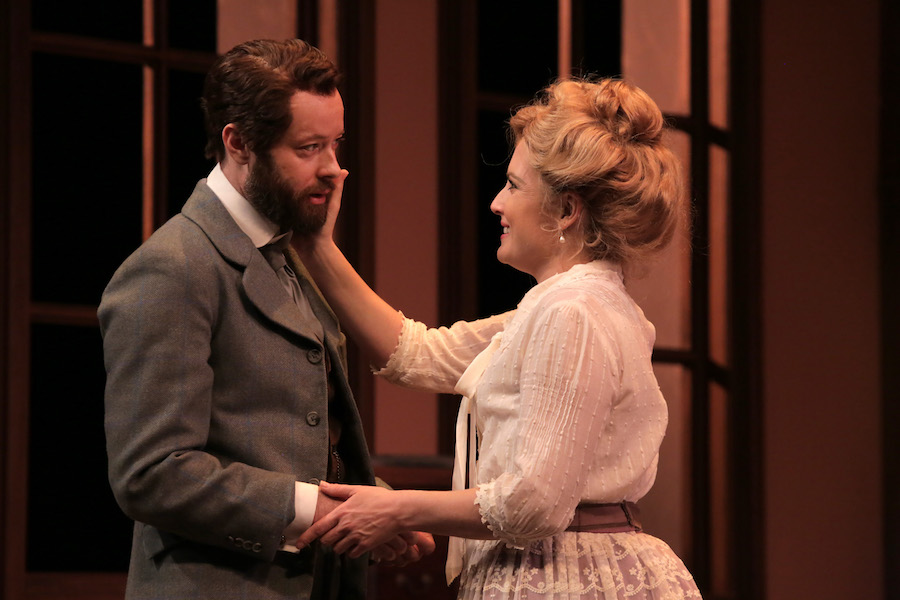Oriel Gray’s 1955 play The Torrents is a historical curio. Its claim to fame is that it won the same playwriting competition that Ray Lawler’s landmark Summer of the Seventeenth Doll did. The Elizabethan Theatre Trust chose to support Lawler’s work, not Gray’s, and the rest is history. Although Black Swan artistic director Clare Watson claims that The Torrents remains relevant today – and there are certainly interesting echoes across the years regarding women in the workplace and some of the more crazy dreams to supply water in West Australia – what is most striking about the play is how it subtly presents an alternative model of what might make Australia a mature nation.
 Luke Carroll, Celia Pacquola and Tony Cogin in The Torrents. All photos © Philip Gostelow
Luke Carroll, Celia Pacquola and Tony Cogin in The Torrents. All photos © Philip Gostelow
Set in a thinly disguised Kalgoorlie (here “Koolgalla”) during the 1890s gold rush, the action focusses on the sparring between the town’s two main patriarchs, newspaper manager Rufus Torrent (played by Tony Cogin, who sports a wonderful period-style beard) and mining magnate John Manson (Steve Rodgers). Torrent is persuaded to support an agricultural irrigation scheme that could benefit the whole region, while Manson insists that individualistic competition on the goldfields is the lifestyle best suited to ruthless colonial men of ambition such as himself. The catalyst for this confrontation comes in the form of Jenny Milford (played by actor-comedian Celia Pacquola), the daughter of a Tasmanian newspaper owner and now a successful and independent-minded journalist. Although not mentioned within the play, the story takes place a few years before women achieved the vote in West Australia in 1900. Further complicating the drama is Torrent’s son Ben (Gareth Davies), an idealist whose life is overshadowed by the relentless energy and charisma of his father, and who is undecided over his engagement to Gwynne (Emily Rose Brennan). Ben makes a rather lukewarm pass at Jenny towards the end of the play.
Gray was influenced by George Bernard Shaw, especially Shaw’s play Pygmalion (on which My Fair Lady was based), and Gray was writing just after the golden age of screwball romantic comedy films. Comparisons to His Girl Friday (1940), also about a self-assured female journalist and based on a play, seem hard to avoid, then and now.
 The cast of The Torrents
The cast of The Torrents
The narrative is fundamentally an allegory about what it means to transition from an initial condition of anti-social, individualist, extraction economies and competition, to a social model which is both more communal and which is actively productive – the gold will come in the form of fruit from the trees, not rocks from the ground, as Jenny and Torrent put it. Such themes were a preoccupation for 1950s authors, Lawler’s own play being an allegory about the decline in the role of rural life in Australia and the dominance of urban centres and their apparently less manly inhabitants.
Despite Gray’s weighty topics, the play is written as a light comedy – although it lacks the flights of verbal repartee which characterises screwball comedy itself. Indeed, Pacquola’s Jenny comes across as far less self-assured and often rather vulnerable compared to Rosalind Russell in His Girl Friday. The strongest moments in Watson’s own production come less from the at times slightly stilted philosophical digressions, or the dialogue between the characters, and rather from some delightful moments of physical comedy and stage business. After failing to impress his father, the drunken Ben makes several failed attempts to throw his hat onto the hat-stand, but later in the play, given accolades by all for his role in promoting the irrigation scheme, he deftly turns and lands the hat precisely on one of the hooks. At another point the lowly newspaper assistants and type-setters are going about their business, moving up and down the stairs at the back of the set, or in from the door underneath them, and they periodically freeze awkwardly as they overhear various harsh verbal challenges between Jenny and Rufus. Sam Longley as the newspaper assistant Jock McDonald is particularly fun to watch, using his enormously long, tall form to exaggerate his movements and behaviour, fastidiously measuring with a ruler the precise placement of pencils for Jenny, or carefully eating his lunch. These moments, which progress neither plot nor character, are like little plays or vaudevillian sketches themselves, and they make an otherwise potentially overdrawn and melodramatic piece hysterically funny at times.
 Gareth Davies and Emily Rose Brennan in The Torrents
Gareth Davies and Emily Rose Brennan in The Torrents
In short, this is certainly a fun night out, but its rather moralising tone means that it isn’t exactly a romp. It does not attain the dizzying heights of US filmic comedy, and reflects a rather more restrained, Shavian and fundamentally British sensibility (despite its overt Australian content). Cast and crew acquit themselves extremely well, and the inventive set, with its multiple entrances, exits and levels, has a lovely patina of age and period detail without being fussy. The opening night audience found it a hoot, though personally I remain slightly mystified at their delight given how unrelentingly 1950s this piece is. I for one am rather glad that Australian playwrights, male or female, no longer feel the need to write such metaphors of how Australia has truly earned and reached nationhood and we can just get on with the job of writing good plays full stop.
Black Swan State Theatre Company and Sydney Theatre Company’s The Torrents is at the Heath Ledger Theatre, Perth, June 15 – 30, and then the Sydney Opera House, July 18 – August 24











Comments
Log in to join the conversation.